 Rufi Thorpe received her MFA from the University of Virginia in 2009. Her first novel, The Girls from Corona del Mar, was long listed for the 2014 International Dylan Thomas Prize and for the 2014 Flaherty-Dunnan First Novel Prize. Her second novel, Dear Fang, With Love, was published by Knopf in May 2016. Her third novel, The Knockout Queen, is forthcoming in 2020, also from Knopf. She lives in California with her husband and two sons.
Rufi Thorpe received her MFA from the University of Virginia in 2009. Her first novel, The Girls from Corona del Mar, was long listed for the 2014 International Dylan Thomas Prize and for the 2014 Flaherty-Dunnan First Novel Prize. Her second novel, Dear Fang, With Love, was published by Knopf in May 2016. Her third novel, The Knockout Queen, is forthcoming in 2020, also from Knopf. She lives in California with her husband and two sons.
She was also my teacher for a Catapult class (which I highly recommend—Catapult in general and any class of hers specifically) and my Twitter friend, which delights me. At the end of the interview are links to connect with Rufi online, and you too will be delighted. Then read her books!
Describe your writing process: schedule, mechanics, environment(s), nuances, and inspirations tangible and abstract. What’s in your head? What’s in your office? What keeps you going?
Because I have two small children, much of my writing for the past six years has been stolen during naptimes. My first son would only sleep if I was beside him, and so I got used to writing in bed right next to him as he napped, semi-recumbent, my laptop on my thighs. With the second one, he just didn’t fucking nap, and so I hired my husband’s cousin to come nanny for us, and she would take him for three or four hours in the morning, and I would sneak away to try desperately to assemble some sense of self, usually in my mother’s apartment, which was adjacent. For some reason, I hardly ever turned on the lights and it was dim in there, and my boobs were full of milk, and I would pull on my own hair and stare at the screen and think: who am I?
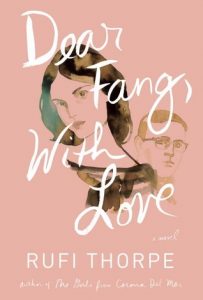 Now my children are older and I have many more hours while they are at school, but those hours still feel somewhat stolen, and that lends the act of writing some urgency. I have never, for instance, had to worry that I would fritter away my few hours with social media. I am also, for better or worse, one of those writers who enjoys the act of writing itself. I enter a kind of narcotic stupor, and I can write twenty pages and then kind of “wake up” and have to figure out if anything interesting happened in them or not. I have to throw away a lot, but it also means I think I torture myself less than is common. Both because my time almost always feel stolen, and because I actually enjoy writing more than any other activity I do, my writing time has almost no ritual element. I don’t have to get in the mood, or become inspired. All that is required is a computer. I suppose the only truly odd thing is that I prefer to be entirely alone and dislike it even if someone is in the next room.
Now my children are older and I have many more hours while they are at school, but those hours still feel somewhat stolen, and that lends the act of writing some urgency. I have never, for instance, had to worry that I would fritter away my few hours with social media. I am also, for better or worse, one of those writers who enjoys the act of writing itself. I enter a kind of narcotic stupor, and I can write twenty pages and then kind of “wake up” and have to figure out if anything interesting happened in them or not. I have to throw away a lot, but it also means I think I torture myself less than is common. Both because my time almost always feel stolen, and because I actually enjoy writing more than any other activity I do, my writing time has almost no ritual element. I don’t have to get in the mood, or become inspired. All that is required is a computer. I suppose the only truly odd thing is that I prefer to be entirely alone and dislike it even if someone is in the next room.
Walk me through your publishing process from final draft to final product, including who does what, how much input you’re allowed throughout, and marketing expected of you.
Oh, interesting! No one has really asked me that before! So, when I finish a first draft, my first move is to show it to a few close friends, also writers, who give me feedback. Then I usually put it away for a while, like aging beef! Then I revise, put it away, revise, put it away. When I’m not sure how else I could possibly improve it, I send it to my agent. That whole process, the beef aging, can be about half a year. Then my agent has LOTS of ideas about how I could improve it. My agent is an incredible editor. I’ve learned more from her than I did from my MFA. So then I rewrite it again. Sometimes she has massive problems with something, sometimes very minimal tinkering. This part takes anywhere from one month to three.
Then we show it to my editor, and (hopefully) she buys it. Once the offer has been made and accepted, then my editor and I usually have a big phone call talking about edits and marketing ideas and how our children are. She just bought my third book, and she’s bought all my books, so we’ve known each other for… six years now? I love her very dearly. Usually her editorial suggestions take anywhere from one month to four months to implement, and then I submit the final manuscript! But it is also, of course, not done yet. Final manuscript is a misnomer. There are still months and months of copyediting to go through.
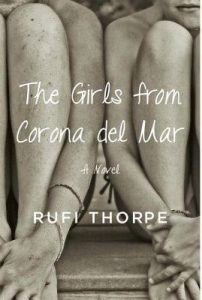 The book undergoes four rounds of copyedits, which involves changes made by the copyeditor, which I then review, everything from spelling or grammar errors, typos, to “would a football game be on at this time of the day on west coast time?” Copyeditors are amazing people. At around this time, you start to see cover mock-ups. While I don’t think I have full cover control, i.e. the ability to legally veto a given cover, my publisher very much wants me to be happy, and if I have a big problem with something they will try to accommodate me. But I’ve been very happy with all the covers they have shown me, so we have never had to really duke it out.
The book undergoes four rounds of copyedits, which involves changes made by the copyeditor, which I then review, everything from spelling or grammar errors, typos, to “would a football game be on at this time of the day on west coast time?” Copyeditors are amazing people. At around this time, you start to see cover mock-ups. While I don’t think I have full cover control, i.e. the ability to legally veto a given cover, my publisher very much wants me to be happy, and if I have a big problem with something they will try to accommodate me. But I’ve been very happy with all the covers they have shown me, so we have never had to really duke it out.
In general, from accepted manuscript to the hardcover publication date is about a year. It’s an incredibly long pipeline.
In terms of marketing, there are parts I am central to, like writing letters to booksellers to be included with ARCs, or going to marketing lunches with booksellers, or doing events once the book is out, and there are other parts, like seeking review coverage, that I don’t have any knowledge of. I do try to write some personal essays to come out the weeks before and after the pub date, just to try to get my name out there, to get passed around on social media. I have no idea if these essays actually sell copies, but I have very much enjoyed learning more about how to write an essay, and they have caused me to read far more essays by other writers than I might have otherwise, so I am quite grateful for that process.
Tell me about your support system—who are your cheerleaders?
My mother and my best friend, both of whom are also writers. They read my drafts, they nurse my insecurities, they agonize with me through every part of the process, from wading out into the primordial soup of a book I am just figuring out to weighing in on the narrator options for the audio book. They are the two smartest women I know, and I would be lost without them.
How does life influence your art; does your work influence your life?
I am not an autobiographical writer, and I don’t ever write characters who are “me” or even who share a lot of biographical detail with me. But certainly life influences art. Your life is your reality, and your art is a depiction of your reality, your convictions: justice is possible or not possible, love is real or illusory, man is moral and celestial, or man is base and animal.
As far as my work influencing my life, I suspect it does in so far as I prefer imaginary people to real ones, and I have been indulged in that to an extent that now I am shit at small talk, and I just get really weird and awkward really fast. It doesn’t happen so much when I’m teaching, but put me at a PTA meeting and I’m sure to tell a woman her earrings look piratical “in a good way” or something.
What do you love most about your creativity? Teaching others?
Well, teaching I love because it is so straightforward. The task is pretty much: “help these people learn to do this thing.” It’s much easier then other tasks, like, “Get these people to win this war,” or “work hard at very boring spreadsheets whilst simultaneously performing complex social hierarchy maneuvers.” I would be bad at both of those! Helping people to learn something is actually very straightforward. You simply tell them everything you know about a given subject and then try to earnestly answer their questions. And of course, every time you teach something you come to understand it in a new way, and the questions you are asked are usually very surprising and interesting and make you think in new ways, so the end result is that you end up learning a lot from your students in the process of trying to teach them something, which makes it extremely rewarding. I mean, I think it is very rare in life that just being earnest and open is all you need for success, but teaching is like that.
Writing is a whole other thing. On the one hand, writing can be very lonely, because no one can really tell you how to do it, and you spend many hours alone, just striving, and you can never really feel satisfied with what you have done. The moment of connection with the reader happens away from you, you don’t get to see it. Sometimes they send you letters and that feels good. It is almost overwhelming to think you have had that kind of effect, and you can’t help but feel very grateful that they have taken the time to write you, but there is another way in which it feels like it has nothing to do with you, like they are simply reporting that they ran into your doppelganger somewhere else where you have never been. And they are like, “Your doppelganger! She was amazing!” And you’re like, “Wow, I’m so glad! I’ve never met her, I hope she is nice.”
But writing is also the place where I am my truest, most essential self. My most real connections to this world have taken place in books, and I am intimately connected and indebted to many novelists I have never met. It is a strange, anonymous intimacy. And if I were to write to them and tell them about it, it would be as useless to them as if I told them I had run into their doppelganger at a Macy’s in south Orange County or whatever. “How nice,” they would say. “Thumbs up.” And yet, they have spoken to me about reality more deeply than I am able to communicate with even my husband. What is one to make of such a connection?
But to get back to your question, which is what do I love about it, I think what I love about it is that it is the place where you get to earnestly try to figure out what the fuck is going on. Why do people hurt each other? What does love look like? Does doing bad things make you bad, or do you have to be bad to do bad things? How well do people know each other?
The writing always asks you: What do you know is true so deeply that you didn’t know you knew it?
And you have to try to answer.
 Connect with Rufi:
Connect with Rufi:
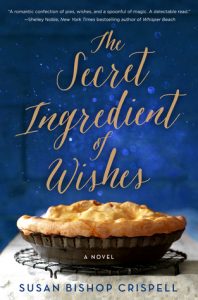 Rachel wished her brother would get lost. And he did. So lost that their parents forgot him and explained him away as Rachel’s imagination, and then as her illness. Having repressed her wish-giving ability through to adulthood, Rachel runs away from her life when the wish-granting bursts forth to affect her best friend’s family. She ends up in Nowhere, NC, where she discovers others’ magic and how to control her own. Crispell’s talented in creating complex characters, with their roller coaster emotions and love-hate relationships with their talents. Like Sarah Addison Allan, the magic is a part of everyday life, including emotional trees and sometimes challenging townspeople. Readers who daydream of having magical capabilities can live out their fantasies through Crispell’s stories. Check out her website
Rachel wished her brother would get lost. And he did. So lost that their parents forgot him and explained him away as Rachel’s imagination, and then as her illness. Having repressed her wish-giving ability through to adulthood, Rachel runs away from her life when the wish-granting bursts forth to affect her best friend’s family. She ends up in Nowhere, NC, where she discovers others’ magic and how to control her own. Crispell’s talented in creating complex characters, with their roller coaster emotions and love-hate relationships with their talents. Like Sarah Addison Allan, the magic is a part of everyday life, including emotional trees and sometimes challenging townspeople. Readers who daydream of having magical capabilities can live out their fantasies through Crispell’s stories. Check out her website 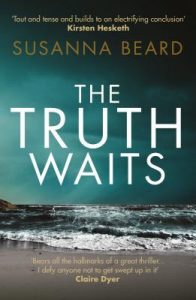 Anna finds a teenage girl’s body on the beach in Lithuania while on a business trip to her textile factory. Prevented from leaving by a natural disaster, she meets a journalist named Will, who moves into her carefully constructed life. He and her friends warn her against pursuing the girl’s murder, but her own past urges her on, until she finds herself in danger, and Will is incommunicado. Beard portrays a workaholic with repressed emotions and memories vividly, though Anna seems to throw up a lot and has quite a few anxiety attacks, not to mention the breakdown from grief. The story seems as self-oriented as Anna, focusing on her distress throughout, when it could have explored the horrors of sex trafficking further. Even as Anna is justified in her wavering faith in Will, his character is not developed enough for the reader to make a judgment call either way. Though the story is a good one, it could have given a little more weight toward other characters, and even considered location a main character in its cultural presence, but Anna simply comes across as too neurotic to notice anything else. I was graciously given a digital copy by the publisher through NetGalley.
Anna finds a teenage girl’s body on the beach in Lithuania while on a business trip to her textile factory. Prevented from leaving by a natural disaster, she meets a journalist named Will, who moves into her carefully constructed life. He and her friends warn her against pursuing the girl’s murder, but her own past urges her on, until she finds herself in danger, and Will is incommunicado. Beard portrays a workaholic with repressed emotions and memories vividly, though Anna seems to throw up a lot and has quite a few anxiety attacks, not to mention the breakdown from grief. The story seems as self-oriented as Anna, focusing on her distress throughout, when it could have explored the horrors of sex trafficking further. Even as Anna is justified in her wavering faith in Will, his character is not developed enough for the reader to make a judgment call either way. Though the story is a good one, it could have given a little more weight toward other characters, and even considered location a main character in its cultural presence, but Anna simply comes across as too neurotic to notice anything else. I was graciously given a digital copy by the publisher through NetGalley.
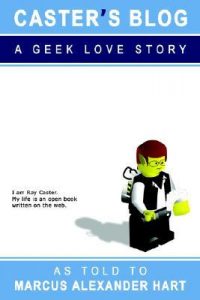
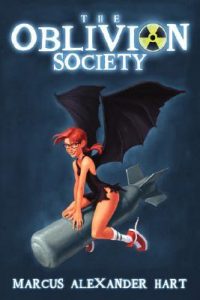 To be honest, publishing with a very small press isn’t that much different from self-publishing. On the positive side, I get a lot of creative control I wouldn’t have at a large publisher, such as input on cover designs and final say on the edits to the text. On the negative side, most of the marketing and promotion responsibilities fall on me. And man, do I hate self-promoting. If I were gregarious and outgoing, I wouldn’t have chosen a job where I can work at home with the lights off!
To be honest, publishing with a very small press isn’t that much different from self-publishing. On the positive side, I get a lot of creative control I wouldn’t have at a large publisher, such as input on cover designs and final say on the edits to the text. On the negative side, most of the marketing and promotion responsibilities fall on me. And man, do I hate self-promoting. If I were gregarious and outgoing, I wouldn’t have chosen a job where I can work at home with the lights off!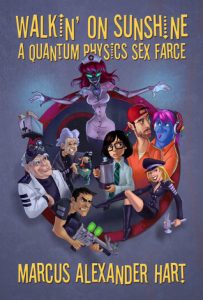 My biggest, best, and most important cheerleader is, of course, my wife Amanda. I’d have given up a thousand times without her constant support and belief in me. She is also the reason no hilarious chapter about explosive diarrhea has ever made it to a final draft of one of my books, no matter how many times I try to sneak one in. So my career thanks her for that.
My biggest, best, and most important cheerleader is, of course, my wife Amanda. I’d have given up a thousand times without her constant support and belief in me. She is also the reason no hilarious chapter about explosive diarrhea has ever made it to a final draft of one of my books, no matter how many times I try to sneak one in. So my career thanks her for that.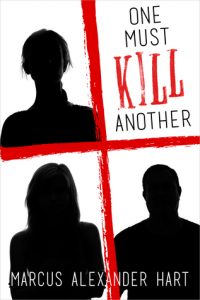 It would be hard to write anything without infusing it with my personal life experience. That’s the fuel that runs the brain machine. The fun part is doing what Mom taught me and changing it from a straight retelling of true events and into an engaging narrative. For example, in my latest book One Must Kill Another, the protagonists are a Hollywood family, and their experiences draw on my time working in the Los Angeles entertainment industry. But deeper than that, their fears and insecurities are also rooted in my own and modified to fit the characters and the story. I think if the underlying emotion is real, the details can be changed and it all still works.
It would be hard to write anything without infusing it with my personal life experience. That’s the fuel that runs the brain machine. The fun part is doing what Mom taught me and changing it from a straight retelling of true events and into an engaging narrative. For example, in my latest book One Must Kill Another, the protagonists are a Hollywood family, and their experiences draw on my time working in the Los Angeles entertainment industry. But deeper than that, their fears and insecurities are also rooted in my own and modified to fit the characters and the story. I think if the underlying emotion is real, the details can be changed and it all still works.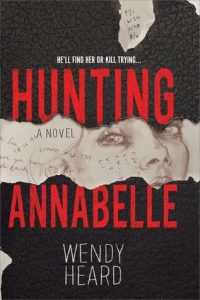 After leaving a California psychiatric prison, Sean Suh relocates to Austin, Texas, where he spends his days drawing people and their auras at a local Disneyland knockoff. A girl with a copper aura tempts him despite his understanding that he need protect her from himself. He witnesses her kidnapping, but no one believes him based on his mental health and conviction record, and suspicion falls more heavily on him as he conducts his own investigation. He learns interesting things about this girl he has immediately fallen for, but he could not have foreseen who did it. Heard brilliantly leads the reader through Sean’s emotional turmoil at each new piece of information; this could well be a manual for becoming a serial killer. Flashbacks from Annabelle’s point of view would have given her more depth. Being privy to Sean’s thoughts exposed his internal struggle, a fascinating insight that almost (but not quite) invokes compassion. Fans of Liane Moriarty and Gillian Flynn will appreciate this novel. I was fortunate to receive a digital copy of this fantastic thriller from the publisher through NetGalley.
After leaving a California psychiatric prison, Sean Suh relocates to Austin, Texas, where he spends his days drawing people and their auras at a local Disneyland knockoff. A girl with a copper aura tempts him despite his understanding that he need protect her from himself. He witnesses her kidnapping, but no one believes him based on his mental health and conviction record, and suspicion falls more heavily on him as he conducts his own investigation. He learns interesting things about this girl he has immediately fallen for, but he could not have foreseen who did it. Heard brilliantly leads the reader through Sean’s emotional turmoil at each new piece of information; this could well be a manual for becoming a serial killer. Flashbacks from Annabelle’s point of view would have given her more depth. Being privy to Sean’s thoughts exposed his internal struggle, a fascinating insight that almost (but not quite) invokes compassion. Fans of Liane Moriarty and Gillian Flynn will appreciate this novel. I was fortunate to receive a digital copy of this fantastic thriller from the publisher through NetGalley.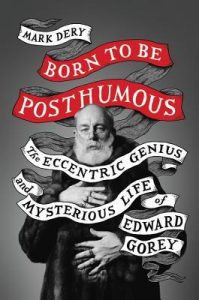 The heartbreak of a good biography is finding out that the artist whose work sings to you is not the person of your imagination. It’s almost like a friendship breaking up over irreconcilable differences. The joy of a great biography is reveling in all the nooks and crannies of the artist whose work speaks to you. Mark Dery’s representation of Edward Gorey’s life is well-researched—including interviews with friends, family, and colleagues—and often feels too intimate, probing as deeply as possible into an ultra private man whose public persona was a purposeful put-on. The brilliant title and chapter headings are Gorey-esque: A Suspiciously Normal Childhood, Sacred Monsters, Epater le Bourgeois, Nursery Crimes, etc. Dery has sectioned Gorey’s life into childhood, education, career moves, and his various obsessions, the main ones being literature high and low, silent movies, and the ballet choreography of George Balanchine, with their corresponding closely-knit fan groups. Any Gorey fan can learn something new in this biography, for the man was quite complex, and he apparently needed little sleep, working on something every moment possible, from his little books sold successfully at Gotham Book Mart, through his book cover art and collaborations, to his work in theater and television. Though far from an open book, Gorey’s career flowed easily through profound and lasting friendships, Dery presenting the development and arc of such friendships with a light touch. Themes running throughout the biography are Gorey’s complex parental relationships, his tendency to keep himself to himself while handing out sardonic opinions like candy, and speculation upon his sexual orientation. Though he’d answered the question of his sexual orientation, speculation continued, with “evidence” pointed out in his work and life. Though Dery may reference the evidence and speculation a bit much, he offers a comprehensive gathering of Gorey’s work and a well-thought-out timeline of his life, with a wonderful takeaway that Gorey made his art to please himself. It’s a must-read biography of a man as interesting and mysterious as his little books of Victorian / Edwardian children suffering unusual demises. Little, Brown & Company graciously sent me an ARC of this fantabulous biography for an honest review.
The heartbreak of a good biography is finding out that the artist whose work sings to you is not the person of your imagination. It’s almost like a friendship breaking up over irreconcilable differences. The joy of a great biography is reveling in all the nooks and crannies of the artist whose work speaks to you. Mark Dery’s representation of Edward Gorey’s life is well-researched—including interviews with friends, family, and colleagues—and often feels too intimate, probing as deeply as possible into an ultra private man whose public persona was a purposeful put-on. The brilliant title and chapter headings are Gorey-esque: A Suspiciously Normal Childhood, Sacred Monsters, Epater le Bourgeois, Nursery Crimes, etc. Dery has sectioned Gorey’s life into childhood, education, career moves, and his various obsessions, the main ones being literature high and low, silent movies, and the ballet choreography of George Balanchine, with their corresponding closely-knit fan groups. Any Gorey fan can learn something new in this biography, for the man was quite complex, and he apparently needed little sleep, working on something every moment possible, from his little books sold successfully at Gotham Book Mart, through his book cover art and collaborations, to his work in theater and television. Though far from an open book, Gorey’s career flowed easily through profound and lasting friendships, Dery presenting the development and arc of such friendships with a light touch. Themes running throughout the biography are Gorey’s complex parental relationships, his tendency to keep himself to himself while handing out sardonic opinions like candy, and speculation upon his sexual orientation. Though he’d answered the question of his sexual orientation, speculation continued, with “evidence” pointed out in his work and life. Though Dery may reference the evidence and speculation a bit much, he offers a comprehensive gathering of Gorey’s work and a well-thought-out timeline of his life, with a wonderful takeaway that Gorey made his art to please himself. It’s a must-read biography of a man as interesting and mysterious as his little books of Victorian / Edwardian children suffering unusual demises. Little, Brown & Company graciously sent me an ARC of this fantabulous biography for an honest review.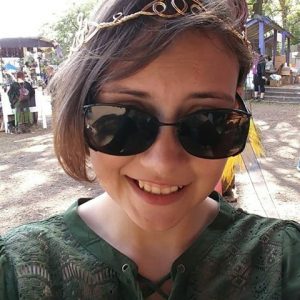 I met Jensen in the best writers group on Facebook—
I met Jensen in the best writers group on Facebook—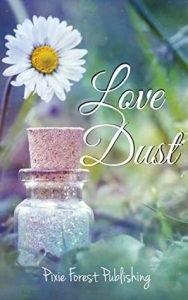
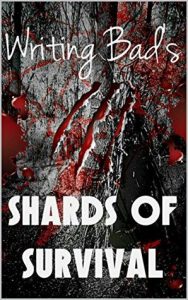 Describe the publishing process from the perspective of the author versus the owner / editor. Explain how you created Pixie Forest Publishing with Donise.
Describe the publishing process from the perspective of the author versus the owner / editor. Explain how you created Pixie Forest Publishing with Donise.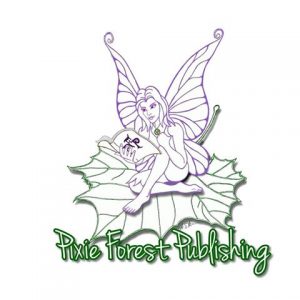 We were talking one night about our publications and anthologies. We are both in Full Metal Horror and were just getting to know each other more. Then we both expressed interest in creating our own anthologies, something we had separately wanted to do for a while, and ended up joining forces to create PFP. With our combined followings and some great support from friends, PFP has really grown since April. We have a different set of strengths and they combine well, and PFP’s success so far is proof.
We were talking one night about our publications and anthologies. We are both in Full Metal Horror and were just getting to know each other more. Then we both expressed interest in creating our own anthologies, something we had separately wanted to do for a while, and ended up joining forces to create PFP. With our combined followings and some great support from friends, PFP has really grown since April. We have a different set of strengths and they combine well, and PFP’s success so far is proof.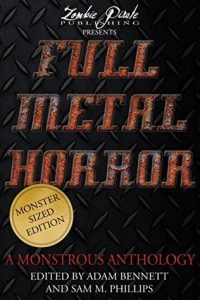 How did you build your support system—your tribe, and how did you become Lead Admin for the best writers group on Facebook?
How did you build your support system—your tribe, and how did you become Lead Admin for the best writers group on Facebook?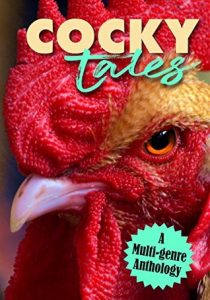 How does your life influence your art and vice versa—what has led you to the delicious, delightful darkness? Do you scare your children?
How does your life influence your art and vice versa—what has led you to the delicious, delightful darkness? Do you scare your children?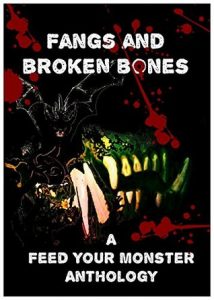 What do you love most about your creativity?
What do you love most about your creativity?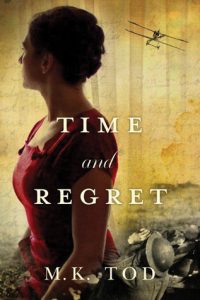 In a post-divorce cleansing, Grace Hansen finds a tackle box her grandpa asked her to keep. Inside she finds mementos from his WWI experience and a letter with a puzzle for her to solve for his redemption. She travels to France to walk through the same towns he did according to the diaries he kept during the war. Her life is in danger as she is stalked and burgled, deepening her grandpa’s mystery, fervently urging her toward resolution. Of course there is a French love interest, an unlikely but not impossible coincidence making the world smaller. Tod’s writing flows so well it seems the reader is walking with Grace through small French towns in her grandpa’s shoes. Fans of Tatiana de Rosnay and Diane Chamberlain, and lovers of history, art, and culture will appreciate this novel. Follow Tod’s forays into her own grandfather’s war experience on her blog
In a post-divorce cleansing, Grace Hansen finds a tackle box her grandpa asked her to keep. Inside she finds mementos from his WWI experience and a letter with a puzzle for her to solve for his redemption. She travels to France to walk through the same towns he did according to the diaries he kept during the war. Her life is in danger as she is stalked and burgled, deepening her grandpa’s mystery, fervently urging her toward resolution. Of course there is a French love interest, an unlikely but not impossible coincidence making the world smaller. Tod’s writing flows so well it seems the reader is walking with Grace through small French towns in her grandpa’s shoes. Fans of Tatiana de Rosnay and Diane Chamberlain, and lovers of history, art, and culture will appreciate this novel. Follow Tod’s forays into her own grandfather’s war experience on her blog